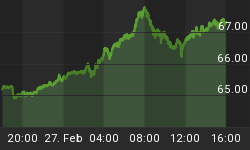Gold goes up with inflation. Except when it goes up regardless...
Everybody's fretting about inflation. Central bankers say there's too little, or will be (just you wait). Lesser mortals feel there's way more than the official numbers let on. And finance professionals think there's a lot more ahead.
"By the time inflation becomes evident," reckons John Paulson of the $14 billion Paulson & Co. hedge funds, "gold will probably have moved, which implies that now is the time to build a position."
"As inflation picks up, the real price of gold goes up," agrees Jeremy Grantham of the $97bn GMO ![]() in his latest letter to clients. And the only asset class with a positive correlation to inflation is gold, according to Credit Suisse's latest
in his latest letter to clients. And the only asset class with a positive correlation to inflation is gold, according to Credit Suisse's latest ![]() Global Investment Returns Yearbook.
Global Investment Returns Yearbook.
So far, so bullish if you agree with Paulson, Grantham and pretty much everyone else that inflation is set to start rising. Because judging by the late 20th century - after gold prices were cut free from their $35-per-ounce peg in 1971 - gold goes up with inflation.
Only problem is, gold has already moved - rising six-fold and more in nominal terms despite the quiestest decade for official US inflation since the 1950s.

What to make of it? First, and to repeat yet again, gold is not simply about inflation. It wasn't in the 1970s, nor the 1980s, and it isn't today. Gold is about inflation and interest rates. Because low or negative real returns on "risk free" bonds and cash force cautious savers to turn instead to a rare, indestructible home for their money. Which cash and bonds aren't.

Second, and for the very same reason - that people don't like losing value year after year - long-term bear markets in equities are typically good for gold prices too. Because if risk capital gets no reward, it looks elsewhere, and when risk capital keeps getting whacked, it turns anxious and runs. Treasury bonds appeal. So does gold.

Over the last century and more, and allowing for dividends too, the real return on US equities has typically been negative when gold was up, and positive when gold was down.
This patterns held true even during the fixed-gold price era of the Gold Standard - a period when gold's inflation-fighting power was sapped first at $26 and then at $35 per ounce. On a five-year horizon, the real return from stocks and gold sat on opposite sides of zero in 59% of all months since 1910. They were both up in one-third of those months. Gold and stocks lost real value together less than 7% of the time, most of which came thanks to world-war inflation.
Whether or not war lies ahead again, "The 800-pound gorilla [of inflation] is not in the room yet, but you can hear him thumping his chest up in the hills," says Jeremy Grantham.
"He will come eventually" - and this gorilla eats bondholders for breakfast, of course. He gnawed on their fixed-income bones all through the '70s, when stocks made an equally miserable investment. He'll have a real feast destroying creditors buying bonds today at the lowest yields in history. But where Grantham suggests buying stocks as "an under-rated inflation hedge", the immediate costs could prove dear.

What to do? The obvious conclusion is to buy gold - so obvious, in fact, that there must be something wrong with it. Especially as gold has already moved, way ahead of that inflation in consumer prices which Grantham and the Credit Suisse report look at, as do BullionVault's charts above.
You could argue the inflation data are wrong, or this time is different, or that inflation simply won't show up, despite the best efforts of central bankers worldwide to drive savers out of cash. But what's undeniable about this bull market in gold so far is that bonds have yet to lose their appeal, while stocks have failed to deliver positive returns. So if or when strong inflation does show up, retained wealth will likely find it hard to resist buying gold - no doubt alongside industrial commodities, land and other hard assets - even after the last decade's myth-busting performance.















